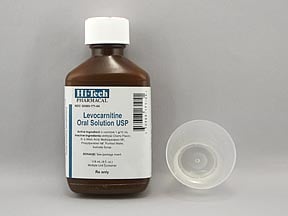
Levocarnitine Coupons & Savings Card – Discount Prices from $15.89
Generic for: Carnitor, Carnitor sf
My prescription
Edit
118ML of 1GM/10ML, Levocarnitine (1 Bottle)
Select pharmacy

CVS
$32.97
COUPON PRICE
Walgreens
$15.89
COUPON PRICE
Walmart
$22.68
COUPON PRICE
Albertsons
$23.03
COUPON PRICELevocarnitine savings card
Show this card to your pharmacist
Walgreens
$15.89
BIN
ID
PCN
GRP
011867
LH06F32110
HT
LABH001
Powered by
More prescriptions for carnitine deficiency
More prescriptions for carnitine deficiency
Price history for Carnitor (brand) & Levocarnitine (generic)
1 Bottle, 10ML
Average retail price for Carnitor
Average retail price for Levocarnitine
Average SaveHealth price for Levocarnitine
Our price history data is based on aggregated prescription data collected from participating pharmacies in America. Our prescription data updates daily to reflect the latest price changes. If you notice a missing data point, it means there wasn't sufficient data available to generate a monetary value for that date.
We analyzed Levocarnitine prices for (10ML, 1 Bottle) over the last 12 months. The average retail price was $24.97, while the average price using the SaveHealth discount card was $8.45. That's a savings of approximately 66.16% when using our Levocarnitine coupon.
Compared to the generic version, Carnitor had an average price of $94.36 over the same time period. With the SaveHealth savings card, Levocarnitine is 91.04% cheaper on average than Carnitor.
*Retail prices are based on pharmacy claims data, and may not be accurate when we don't have enough claims.
Levocarnitine dosage forms
Dosage Quantity Price from Per unit 10ML 1 Box $4.21 $4.21 10ML 2 Boxes $5.92 $2.96 10ML 3 Boxes $7.63 $2.54
| Dosage | Quantity | Price from | Per unit |
|---|---|---|---|
| 10ML | 1 Box | $4.21 | $4.21 |
| 10ML | 2 Boxes | $5.92 | $2.96 |
| 10ML | 3 Boxes | $7.63 | $2.54 |
